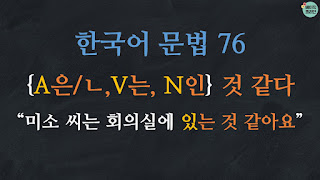Learn Korean | Korean Grammar 137: A/V-았느냐고 하다/었느냐고 하다/했느냐고 하다 (indirect quotation)
In this lesson, we will look at the expression 'A/V-았느냐고 하다/었느냐고 하다/했느냐고 하다' which is used to indirectly quote a sentence whose type of sentence is 'interrogative sentence', ends with 'adjective/verb', and the point of time is 'the past tense'.
Let's learn 'indirect quotation' in Korean 'A/V-았느냐고 하다/었느냐고 하다/했느냐고 하다.'
If you want to watch this lesson in Korean with English subtitles, please click the link below.
🌷 Korean grammar lesson 137: https://youtu.be/9DPZW-cgDBU
⭐️ Korean Grammar 137: A/V-았/었/했느냐고 하다 [묻다]
‘어제 집에 잘 도착했느냐고 물어봤어요.'
1. Short Conversation
- 미소: 지안 씨, 나나 씨는 어제 집에 잘 도착했나요?
- 지안: 아마 그랬을걸요? 이따가 만나면 한번 물어볼게요.
⥥⇓
- 지안: 나나 씨, 미소 씨가 어제 집에 잘 도착했느냐고 물어봤어요.
- 나나: 네, 덕분에 집에 잘 도착했다고 전해주세요.
→ The grammar we're going to learn today is '도착했느냐고 물어봤어요.'
(in English)
- Miso: Jian, did Nana get home well yesterday?
- Jian: Perhaps it was? I'll ask you when we meet later.
⥥⇓
- Jian: Nana, Miso asked if you arrived home safely yesterday.
- Nana: Yes, thanks to her, let her know that I arrived home safely.
2. Usage
- Indirect quotation: this expression is used when the speaker quotes another person's question indirectly.
- Interrogative, adjective/verb, past tense: '-았느냐고 하다/었느냐고 하다/했느냐고 하다' is used after an adjective/verb stem when a quoted sentence is an interrogative sentence, ending with an adjective or a verb, and the past tense.
- '-았/었/했-' is an ending of a word that indicates an event or action has occurred in the past.
- ‘느냐고 → 냐고’: when you talk, you can use ‘냐고 하다.' which is a short form of '느냐고 하다.' So you can also say '-았냐고 하다/었냐고 하다/했냐고 하다.'
- And instead of the verb ‘하다’, you can also use ‘묻다, 질문하다, 말하다.’
3. Example Sentences:
✎ 미소: “어제 집에 잘 도착했어요?” (→ verb, past, interrogative)
(Did you get home well yesterday?)
→ Indirect quotation: 어제 집에 잘 도착했느냐고 물어봤어요. (도착하다 + 했느냐고 하다)
- When you look at this sentence, it ends with the verb. The point of view is in the present, and it is an interrogative sentence.
- If you want to quote indirectly, you can add '-했느냐고 하다' after the verb '도착하다.'
- And when writing, delete the double quotation marks.
- Then you can say ‘어제 집에 잘 도착했느냐고 물어봤어요.’
- Here ‘도착했느냐고 물어봤어요' is a combination of the verb 도착하다 and '느냐고 묻다'.
- When the sentence you want to quote ends with a verb, is in the past tense and is a declarative sentence, you can say it by combining the 'verb stem' followed by '-했느냐고 하다'.
→ (when speaking): 어제 집에 잘 도착했냐고 물어봤어요. (도착하다 + 했냐고 하다)
- When you speak, you can shorten '느냐고' and say '냐고.'
- Then you can also say ‘도착했냐고 물어봤어요.’
✎ 미소: “어제는 날씨가 좋았어요?” (→ adjective, past, interrogative)
(Was the weather nice yesterday?)
→ Indirect quotation: 어제는 날씨가 좋았느냐고 물어봤어요. (좋다 + 았느냐고 하다)
- When you look at this sentence, it ends with the adjective. The point of view is in the present, and it is an interrogative sentence.
- If you want to quote indirectly, you can add '-았느냐고 하다' after the adjective '좋다.'
- And when writing, delete the double quotation marks.
- Then you can say ‘어제는 날씨가 좋았느냐고 물어봤어요.’
- Here ‘좋았느냐고 물어봤어요' is a combination of the adjective 좋다 and '았느냐고 묻다'.
- When the sentence you want to quote ends with an adjective, is in the past tense and is an interrogative sentence, you can say it by combining the 'adjective stem' followed by '-았느냐고 하다'.
→ (when speaking): 어제는 날씨가 좋았냐고 물어봤어요. (좋다 + 았냐고 하다)
- When you speak, you can shorten '느냐고' and say '냐고.'
- Then you can say ‘좋았냐고 물어봤어요.’
4. Combination Information
- It attaches after an adjective/a verb stem.
(1) Vowel ㅏ, ㅗ: -았느냐고 하다 (았냐고 하다)
- When a vowel in a verb stem is 'ㅏ' or 'ㅗ','-았느냐고 하다' is used.
- 닫다 + 았느냐고 하다 → 닫았느냐고 하다
- The vowel in '닫' is 'ㅏ', so '-았느냐고 하다' is used.
- 닫다 + 았냐고 하다 → 닫았냐고 하다 (when speaking)
(2) Other vowels: -었느냐고 하다 (었냐고 하다)
- When a vowel is an adjective/verb stem' is other vowels, ‘-었느냐고 하다' is used.
- 먹다 + 었느냐고 하다 → 먹었느냐고 하다
- The vowel in '먹' is 'ㅓ', so '-었느냐고 하다' is used.
- 먹다 + 었냐고 하다 → 먹었냐고 하다 (when speaking)
(3) 하다 → 했느냐고 하다 (했냐고 하다)
- When a verb/adjective ends in '하다', change '하다' to '했느냐고 하다.'
- 공부하다 + 했느냐고 하다 → 공부했느냐고 하다
- ‘공부하다’ ends with ‘하다’, so '-했느냐고 하다' is used.
- 공부하다 + 했냐고 하다 → 공부했냐고 하다 (when speaking)
5. Practice
✎ “시험이 어려웠어요” (Was the exam difficult?”)
→ 시험이 어려웠느냐고 물어봤어요. (어렵다 + 었느냐고 묻다)
→ 시험이 어려웠냐고 물어봤어요. (어렵다 + 었냐고 묻다)
✎ “그 영화를 봤어요?” (Did you watch the movie?)
→ 그 영화를 봤느냐고 물어봤어요. (보다 + 었느냐고 묻다)
→ 그 영화를 봤냐고 물어봤어요. (보다 + 었냐고 묻다)
✎ “어제 운동했어요?” (Did you exercise yesterday?)
→ 어제 운동했느냐고 물어봤어요. (운동하다 + 했느냐고 묻다)
→ 어제 운동했냐고 물어봤어요. (운동하다 + 했냐고 묻다)
✔︎ Quiz PDF: https://drive.google.com/file/d/1C7vDuLq7uqYUszp-19fRjxp49G7w4dQG/view?usp=sharing
❓Quiz: (보기)와 같이 문장을 간접 인용해 보세요.
(보기) “어제 집에 잘 도착했어요?”→ 어제 집에 잘 도착했느냐고 물어봤어요.
----------------------------------------------------------------------------------
1. “그 소식을 들었어요?”
→ ________________________________________ 물어봤어요.
2. “어제 많이 바빴어요?”
→ _________________________________________ 물어봤어요.
3. “어제 회사에 무슨 일이 있었어요?”
→ _________________________________________ 물어봤어요.
4. “지안 씨는 어디 갔어요?”
→ ___________________________________ 물어봤어요.
5. “어제 날씨는 어땠어요??”
→ ___________________________________물어봤어요.
#베이직코리안 #한국어문법 #Basickorean #Koreangrammar #았느냐고하다 #었느냐고하다 #했느냐고하다 #냐고하다#간접인용 #간접화법 #indirectquotation
_basickorean.jpg)

